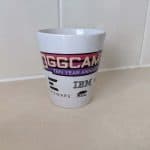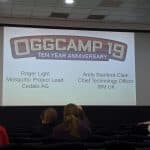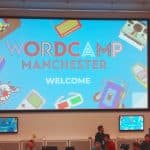Over the past 10 years, I have been able to use free and open source software to benefit my personal and work life, by using Linux I have gained an understanding of what it really is, and how it can be used to make a perfect server or desktop OS.
2010
Starting in 2010 I really didn't know much. I heard about Linux on various websites, podcasts, etc at the time.
I booted up a live CD of Ubuntu 10.04 LTS on an old computer I had. I was amazed, it was quick to boot and easy to use; this is when I was became hooked!
I wanted to learn more about Ubuntu, what was it? Were there other distributions around? Of course, but I tried a few others too but always stuck to a Debian based distro (not sure why, maybe it was the familiarity).
2012
I built a mini-itx Nas, this was my first major project using a Linux OS. I had experience in building PCs already but this was also my first time building one based on the mini-itx form factor.
The specs weren't the greatest, but it worked fine as a headless Nas. There is more info regarding the build in an old blog post here.
The main specs were:
- Antec ISK 300-150 Mini-ITX Case
- Intel D410PT Desktop Motherboard with Intel Atom (D410 1.66GHz)
- 120GB WD 2.5 SATA Scorpio Blue HDD
- Corsair Memory XMS2 2GB DDR2 PC2-6400 (800) Dual Channel
The OS of choice this time was Ubuntu 12.04 LTS. This was the latest LTS release at the time. I was running the server headless so always interacted with it over SSH.
The main duties of/software installed on this server were:
- Samba for file sharing.
- Cups to handle print serving.
- I also decided to install Mediatomb for media streaming to my UPnP devices
- vsftpd (Very Secure FTP) was installed for FTP file transfer
- Apache2 was also installed so I could host an internal website it required
I have found a few pictures of this server from my photo library:
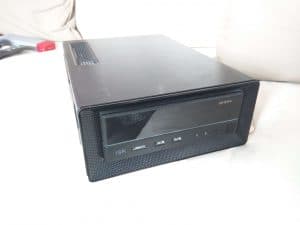
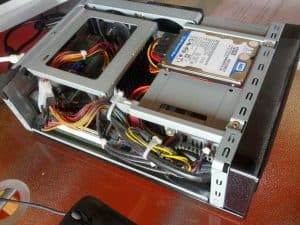
2015
Starting my career as a Front-End web developer, meant I required to have somewhere to host websites for my portfolio.
I thought I should put the sills and experience I gained over the past few years to good use.
I began searching for web hosts, a lot were shared hosting which would have been fine, but these hosts would not give me much access (if any) access to the underlying OS.
This was when I can access Digital Ocean. Still a small start-up in 2015, they were only four years old at the time.
From the WayBack machine in 2015:
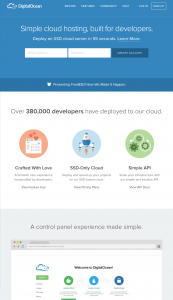
I found their cheapest Droplet (essentially the same as a VPS) was $5 per month, and included:
- 20GB SSD
- 512MB RAM
- 1 virtual core CPU
More importantly, I could load my own OS and have full access via SSH.
I loaded up Ubuntu 14.04 LTS and setup Apache2 VirtualHosts and MySQL DBs, installed PHP and setup SFTP.
Of course, I enabled Snapshots within the Digital Ocean control panel -- always good to have regular backups.
This server became my main web server until 2018.
2016
2016 was a big year, I upgraded my home server to a 'beefy' new server motherboard with Raid and ZFS. And bought a 6U rack mount case for some network switches.
A have an in-depth paper here describing some of the equipment, and how I installed Ethernet in my first home back in 2017.
I've long heard about how ZFS was the next big thing in the open source community as far back as 2011, mainly from Alan Jude, former co-host on the TechSnap podcast.
At the time, ZFS was mainly available on FreeBSD only, I decided to wait until it was available by default in Ubuntu.
It was until Ubuntu 16.04 that I decided to use ZFS.
With the new server I built, I created a Zpool, consisting of two mirrored WD Red 3TB drives.
I also decided to use LXC/LXD containers. These containers use the ZFS pool for their storage, which meant I could set ZFS quotas on these containers to limit their file system size.
This was the first time using ZFS and LXC, I really learnt a lot throughout this process, I produced a lot of documentation and created a script to easily create container backups. This can be seen here.
These are the main specs of the new server:
- Antec 300 ATX case
- Corsair 430 watt CX PSU
- 16GB Crucial ECC registered DDD3 memory
- 2x Western Digital Red 3TB SATA HDDs
- 120GB OCZ SSD
- Intel Core i3
- Supermicro X10SLL-F Motherboard
The main duties of this server were similar to the build I made in 2012, but now 'containerised' to help with security, backup and restoration:
- Cups print server (with USB pass through)
- Storage (main Nas shares with Samba)
- Emby (media steamer)
- FreePBX
- Ubuntu Landscape (central management)
Here is an image of this setup:
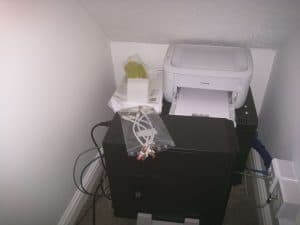
Beginning of 2018
After learning a lot about ZFS and LXC containers when building a new home server in 2016, I found the Digital Ocean web server I setup in 2015 was getting low on resources, I was outgrowing the small amount of Memory and CPU.
Instead of just upgrading the droplet, I thought it would be better to take the plunge into running a new web server with ZFS and LXC containers; much like my home server.
OVH looked to be the best 'big player' offering a considerable amount of Memory for a low cost per month, they also had servers available in London, UK.
I purchased a years worth of hosting with their 'VPS SSD 2' package which consists of:
- 1 vCore(s) (From 2 GHz)
- 4 GB RAM
- 40 GB SSD
I setup Ubuntu 18.04 LTS, setup the ZFS and LXC software and created three containers:
- HAProxy
- 2x Web hosting containers (these containers include Apache, MySQL and PHP) -- two containers, one for myself, the other for client hosted sites
This was my first time using HAProxy. It took a while to get to setup correctly, as I also used LetsEncrypt via the proxy to generate SSL certificates.
HAProxy works by checking the domain requested, if it matches one of my personal domains, it will be directed towards my personal web container, any other domains will be directed to the web container which hosts client websites.
I've been running this setup for a few years and has been working great, I've not had any issues.
End of 2018
In the same year, I purchased a new laptop.
It came with Windows 10, but that was quickly removed.
Around this time Pop!_OS had been making the 'rounds' on new sites and YouTube videos for a little while.
I played around with a live USB of Pop!_OS already, and I really liked what I experienced, the OS is polished and quick. As a big Ubuntu user for many years, I still wanted to use it on my servers, but for a desktop OS, Pop offered a slightly better product.
I installed Pop!_OS on the new laptop, I had two drives (SSD and HDD) installed so it took a bit of tweaking to enable LUKs on boot encryption, but I finally managed to get it working perfectly.
Now the laptop works perfectly, much better than Windows ever could be. And Pop! OS just keeps getting better.
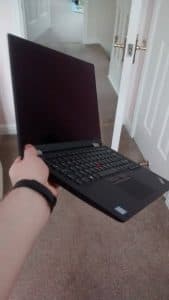
2019
Continuing the trend of buying new hardware (I love new tech!)
I started watching videos on YouTube by Lawrence Systems, some of my favourite videos were about PFSense, which is open source router software.
I built my own router by purchasing a low cost small-form factor Mini PC from AliExpress. The model I chose was a Qotom Mini PC. I added my own memory (4GB) and hard drive (16GB).
Installing PFSense from USB was seamless, and the network adaptors were immediately found. I ran through the installer, once completed I was able to login into the web interface straight away.
I do still have to use my ISP's unit, but in Modem Mode only. PFSense then acts as the router and firewall, providing DHCP and DNS to my network.
I love the regular updates, the open source aspect is great, it gives me peace of mind that the software is secure.
You can read a separate blog post about the Qotom Mini-PC here.
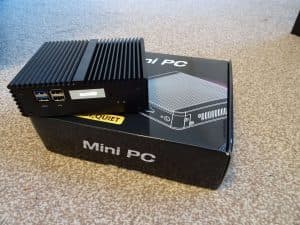
2020
It has only been a few months into 2020. I have already made a few improvements to my PFSense router.
I have enabled OpenVPN setups for:
- VPN route into the home networking (allows me to access resources when not at home)
- Web Server connects into VPN to save backups onto the home servers
- Site-to-Site VPN with PFSense and Raspberry Pi Zero (stored at parent house to measure internet speeds using the Speedtest CLI)
I've also added a few more containers to my Home Server:
- LibreNMS
- Home Assistant
In the future
Overall these past 10 years have been great. I've learnt a lot, experienced what the open source community has to offer (I travelled to events such as OggCamp and WordCamp).
What will happen in the future, I'm not sure but I know the free and open source movement will still be going strong.
